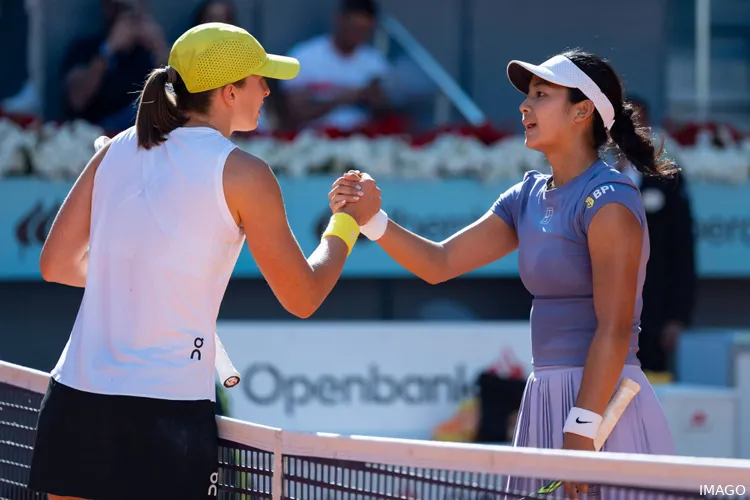
In the vibrant atmosphere of the 2025 Madrid Open, where the clay courts of the Caja Mágica hosted a thrilling second-round clash between Iga Swiatek and Alexandra Eala, an off-court controversy stole the spotlight. The Women’s Tennis Association (WTA), tasked with promoting the tournament’s marquee matches, found itself embroiled in a digital debacle after posting AI-manipulated images of the two players on its official website. The discovery, brought to light by a keen-eyed tennis journalist, sparked widespread debate about the ethics of using artificial intelligence in sports media and raised questions about authenticity in an era of rapidly evolving technology.
The match itself was a gripping affair. Swiatek, the former World No. 1 and a clay-court maestro, faced a stern test from Eala, the 19-year-old Filipino rising star who had previously defeated her in Miami. Eala surged to a set and a break lead, her aggressive baseline play and deft touch troubling the Polish star. But Swiatek, known for her mental fortitude, battled back, clawing her way to a 4-6, 6-3, 6-2 victory in a two-hour epic. “It was a tough one, but I’m proud of how I stayed focused,” Swiatek said post-match, her relief palpable as she advanced to the third round. Eala, gracious in defeat, reflected, “I gave it everything, and playing Iga on clay is always a learning experience.”
Yet, the real story emerged hours later when fans noticed something amiss on the WTA’s website. Promotional images of Swiatek and Eala, intended to hype the match as a clash between a tennis titan and a burgeoning talent, appeared strangely altered. Swiatek’s image showed subtle distortions—her facial features slightly smoothed, her kit’s logo oddly warped. Eala’s photo was even more striking: the Nike swoosh on her apparel was misaligned, her sponsors’ logos were erased, and her fingers appeared an unnatural shade. “These images are bizarre, like something out of a digital uncanny valley,” one observer noted on social media, echoing the sentiment of thousands who flooded platforms like X with screenshots and critiques.
The journalist who uncovered the issue pointed to AI as the culprit, suggesting the WTA had used generative tools to “enhance” or fabricate the images rather than relying on authentic photographs. The backlash was swift. “Why resort to AI when real photos from the match exist?” a fan posted, capturing the confusion and frustration. The WTA, under pressure, replaced Swiatek’s image with a genuine one, but the damage was done. The incident highlighted the pitfalls of AI in sports marketing, where the quest for polished visuals can backfire, alienating fans who value transparency. “Couldn’t stop thinking about the bizarre AI-mangled images that have been atop the WTA website,” the journalist wrote, urging the organization to rethink its approach.
For Swiatek and Eala, the controversy was an unfortunate distraction from their on-court heroics. Swiatek, a five-time Grand Slam champion, has been a vocal advocate for authenticity, often sharing unfiltered glimpses of her training on social media. Eala, meanwhile, is carving her path as one of Asia’s brightest prospects, her Madrid performance a testament to her potential. “Alexandra pushed me to my limits today,” Swiatek praised, while Eala vowed to “keep growing” after her valiant effort. Their match, billed as a generational showdown, deserved the spotlight, yet the WTA’s digital misstep overshadowed their brilliance.
The incident has broader implications for tennis and beyond. As AI tools become ubiquitous, sports organizations face a delicate balance: leveraging technology to engage fans while preserving the sport’s integrity. The WTA’s blunder serves as a cautionary tale, underscoring the need for oversight and accountability. Fans on X called for the WTA to “stick to real photography,” while others debated whether AI could ever capture the raw emotion of a Swiatek forehand or Eala’s infectious smile. For now, the organization has remained silent, but the episode has sparked a vital conversation about trust in the digital age.
As Swiatek prepares for her next Madrid challenge and Eala regroups for Rome, the tennis world is left reflecting on a strange chapter. The court may be where champions are made, but in 2025, it’s clear that the digital arena demands just as much precision—and authenticity—as a perfectly placed drop shot.
Leave a Reply